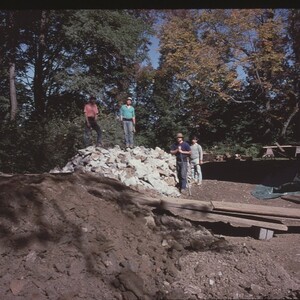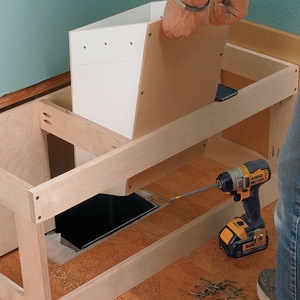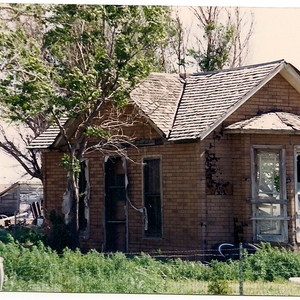On my house, build 1986,I have a well about 100 feet down. Lately ,since a year,I have a sulfur smell on my cold water How do I get rid of it?
Hilmar
Discussion Forum
Discussion Forum
Up Next
Video Shorts
Featured Story

Fine Homebuilding is excited to be the official media partner of the 2024 Building Science Symposium series! This event offers builders, tradesmen, architects, designers and suppliers to discuss topics ranging…
Featured Video
Video: Build a Fireplace, Brick by BrickHighlights
"I have learned so much thanks to the searchable articles on the FHB website. I can confidently say that I expect to be a life-long subscriber." - M.K.

















Replies
More than likely sulphur bacteria. Chlorinate the well, I'm not sure of the concentration figures my well is 75 ft with a 40 ft head of water. I used 2 gallons let it sit for 6 hours then pumped it until the chlorine smell was gone. Do not over chlorinate or let it sit to long or the chlorine taste will be difficult to get rid of. Check with your well driller or the local health department for chlorine concentration ratios.
Hoping for replies on this one. Got a client with same problem but I have no answer. Just installed new water softener - can't imagine there's any correlation. Customers water smells like a McDonalds mcgrill in the mcmorning!
Carl
Sometimes the water can change over a period of time. Water runs in veins through the ground and picks up minerals as it does. The best way to get rid of all of the smell is by using a reverse osmosis system on all of the water inside. These systems are on the expensive side but they do work very well. To chlorinate the system wouldn't hurt anything though. When I used to work with the old man (well driller) we would use some chlorine pellets and then pump it for about eight hours straight to get rid of the residue. One thing that will help if you're going to take the time to do this would be to pull the well cap off and run it back down the casing for a while to get all the drop pipe and the inside of the casing as well.
May I recommend getting your water checked by two reputable firms that will test for your problem. A good company will determine what the odor is and be able to offer a solution to correct it. Installing a water softener without have the water analyzed is just stabbing in the dark. A reputable company will offer a water softener, and other filters if necessary, sized for your GPH system and composed of a resin bed matched to correct the chemistry of your water. The odor could be manganese, iron, sulphur, or H2S related along with certain bacteria that thrives with one of those elements.
Regards,
Virginbuild
The sulphur smell is common when iron is present in the water. Get the water checked.
I agree with the last post about it sometimes being present in iron formations.. it's also common in shale formations as well.
There is more than one potential cause, and a number of potential solutions. I like to refer people to the Water Systems Council website (they also have a hotline that you can call).
The link below will take you to their page of "fact sheets". Scroll down to find "sulfur". If you decide to try chlorinating the well, take a look at their fact sheet on disinfecting a well.
http://www.watersystemscouncil.org/wellcare/infosheets.cfm
The sulphur-producing bacteria that you likely have - sulphur is a by-product of their metabolism - unless your water suddenly began picking up sulphur out of the ground, are not a health issue, but can 'slime' your pump, etc. Here's a link:
http://www.nesc.wvu.edu/ndwc/articles/OT/FA03/well.html
I got the condition in my well and was told it was irreversible, that i needed a lot of filtration, etc. I tried dumping four gallons of bleach down the 160' well, then ran a garden hose from the yard hydrant down the well casing and circulated the water for about 30 minutes. If you don't have a hydrant, you can carefully pour the bleach around the circumference of the casing. It's important to get the chlorinated water all over the inside of the casing, too, or the bacteria can re-infect the well. It's an extremely good idea to wear glasses for this as bleach is awfully corrosive. It won't damage your wiring, or so a couple pump guys reassured me.
Then you need to run each tap, including laundry lines, outdoor spigots, etc., until you smell chlorine. Let it sit an hour or so, then flush as much of the well capacity as you can out the hydrant, bec you don't want more chlorine in your septic system than absolutely necessary. Keep it off any shrubs you like, too. Then flush the lines in the house.
I did this to my well three years ago after the smell had become completely unbearable, and haven't had a recurrence of the sulphur problem since. I was told by a pump man that leaving drip irrigation and 'leaky' hose attached to a hose bib is a common source of contamination, so i use backflow preventers on all outside spigots and hydrants now.
When you shocked it did you get a bunch of red stuff in the water after? I just shocked mine after reading this and a few other things, figured what the heck but I got lot of red dirty water coming out after, really had to flush the water heater. Hope it works for a while.
The red color is (probably) iron. Shock chlorination oxidizes the iron that is in the water and causes it to precipitate out of solution. If you haven't already done so, you ought to check the aerator screens on your faucets.
Thanks, They were pretty much all full. I flushed the water heater from the base. Do you know how long this usually lasts in getting rid of the odor? Pretty much everyone in the area has the same issue with odor.
Not a really satisfactory answer, but "it all depends." Killing all of the bacteria iron bacteria in the well can be difficult, and it is possible that the aquifer is also contaminated from another source, which means that as you pump water, you'll eventually draw more bacteria into the well, and the problem will recur. The chlorination may last months. You could chlorinate the well on a routine basis, or you may want to try another treatment method to remove the odor from your household water.
A local well driller who is familiar with the extent of the problem in your area should be able to give more specific advice.
Thanks, I guess if it does not last long I will look at other options. Also, I am worried that if I shock it to often I will harm the septic system with to much bleach. Thanks for the assistance
Edited 7/25/2006 9:45 am by rjgogo
When you flush the well after chlorinating it, you should run most of the water onto the ground surface away from the septic system, and not into the tank. That's mostly to keep from just overloading the system with liquid. A little bit of bleach won't hurt the tank. A real overload, like from shocking the well, might kill all of the bacteria, and upset the system temporarily. Fortunately, once the bleach works it's way out of the tank, you'll be putting back all of the microbes necessary for the tank to work properly.
Theoretically, at least, the iron and other consituents flushed out of the well could cause a problem with soil interface in the drainfield. There's a lot of debate about the backwash from water softeners doing that, but the jury is still out on whether it has any practical effect.
Thanks, the smell is starting to come back already. It is not sulfur gas as it still smells when left in a bucket overnight but it is bacterial and in the water table itself. Everyone in the area has a similar issue as I have been in a few houses there and it cannot be mistaken. There were coal strip mines in the area and from what I have read that could be the cause. I am sure some have used filters, but some others just live with it. Don't think we can live with it as my DW comes from the city where the water is always perfect. I don't care for it much either.
I had looked into a Greenfield filter on-line but I think I am going to use a local company that will give a guarantee of results. May cost a bit more but there will be no doubts about the effectiveness as I will write the terms into the contract. It if does not remove the odor I should not have to pay and they can take it back, If they have a problem with that then I know they are not the right outfit and I will find one that is agreeable to those terms. They should have the experience in the area. Kind of bummed that it did not last but I am only out 3 bucks and some time. If I do it every week I will kill the septic system. I was careful to flush from the hose but the hot water take still fills up, took a few buckets out of that to eliminate a little more from the septic
Thanks for the input.
I didn't get rusty water myself, but i have neighbors in a little deeper strata who do get rusty water and must filter it out. I shocked a galpal's well about ten days ago (not a sulphur issue, but a loose well cap and consequent contamination)...no rust afterward there, either. The red water could also be rust in the casing breaking off, esp if you did the recirculation thing using a hose from the hydrant pointed down the casing. The screens will be a mess, and also your lawn sprinklers and valves for them. Sorry i didn't warn you about plugging them up. :(
no worries on the warning, I kind of hijacked this thread anyway as I have the same problem as the OP. I figured the further questions would be okay as we have the same issues. Good link. Thanks, Rob.
There are a lot of sulfur smelling wells in our county.
If it isn't a bacterial problem, and it sounds to me like it may be, then you will probably have to go for both water softening and for and RO unit, at least for drinking and cooking water.
The old ranchers way of dealing with sulfur smell is to run the water into a big stock tank and let it set. Exposure to air will remove most of the sulfur. Or at least that's the what the old timers around here claim.
+++++++++++++++++++++++++++++++++++++
"Doubt is not a pleasant condition, but certainty is absurd." Voltaire
My well is 320 ft deep....had this problem once.
The smell is from microscopis "sulphur particles" that are from a living microorganism. The only fix is to shock the well with chlorine tabs. (use the small ones, the large 3" ones can take days to disolve).
A reverse osmosis system ($3-6K) will remove iron and lots of other things, BUT NOT SULPHUR SMELL. Not even when coupled w/ a whole house charcoal filter (about $1K).
You have to "shock" the well to kill the organisms.
Also, afterwards, it is a good idea to change all the little "aeroators" on you faucets.
shocking the well with chlorine will work if it is sulfur bacteria, but most likely the odor will come back. recommend you look into a chlorine injection system with carbon backwashing filter.. if you are in bloomingberg ny, would call aquascience in poughkeepsie. As for an r/o removing iron, it will, for a brief period of time, then the membrane in the r/o gets fouled and you will need a new one. The chlorine injection will also work at removing iron
My well is 600ft. After a year of so we started getting sulfur smell. It got worse over time. Shocking did not remove the smell.
We eventually had to put in an aeration system. It sprays the water through nozzles under pressure. This causes the sulfur gas to seperate from the water. A fan then removes the sulfur gas, and the water sits in a tank, were a pump and float system supply the house pressure tank.
System has been running for about 1/2 year now, and works great. No smell, and sulfur gas build up in the water.
Order my unit from
http://www.waterefining.com/